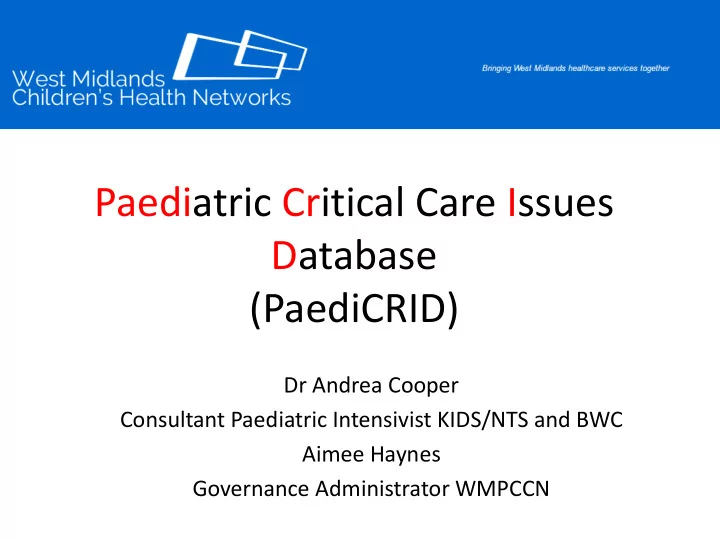

Paediatric Critical Care Issues Database (PaediCRID) Dr Andrea Cooper Consultant Paediatric Intensivist KIDS/NTS and BWC Aimee Haynes Governance Administrator WMPCCN
PaediCRID is 1
Background It has been 12 months since The West Midlands Paediatric Critical Care network launched the Paediatric Critical Care Issues Database (PaediCRID). PaediCRID is used to record issues involving two or more organisations which impacted on the care that a child received. The system will help us identify issues within the region, improve practice and encourage learning in Paediatric Critical Care. PaediCRID is also used to capture events of excellence within the region and to share the learning these provide. Network governance issues are being discussed at Network Governance Group, with a view to disseminating learning and identifying solutions through the quarterly newsletter and regional forums.
One year on… Since the launch of PaediCRID on 28 th November 2017 we have gradually seen an increase in DGH’s using the system to report both issues and excellence events. We have already seen some changes as a result of PaediCRID reporting and this has highlighted areas to discuss and learn from at our regional forums. In total 28 issues and 13 excellence events have been reported onto PaediCRID.
West Midlands flying the flag West Midlands are flying the flag for for Network Governance! Network Governance!
Excellence events - themes • Management of cardiac arrest patients • Excellent working relationships between KIDS and DGH’s • DGH’s managing sick patients whilst waiting for KIDS retrieval • Extubation at DGH’s allowing patients to stay at the local hospital and not requiring transfer to an OOR PICU • The region working together for the best outcomes for the patient
Learning from PaediCRID – issues raised - Initiating withdrawal of care at DGH’s, difficult conversations - Anaesthetic teams feeling out of their comfort zone managing paediatric patients - Delay in PACS images being sent over (local Radiology) - Safeguarding concerns not being handed over to receiving DGH - DGH not informing their consultant of a sick patient - Delay in getting a CT head scan - Delay in local team mobilising for a time critical transfer
Learning from PaediCRID – issues raised - Peripheral strength inotropes to be included on the KIDS drug calculator - Perceived rudeness from transport team member - Recognition of severity of illness of child by the DGH - Communication issues between different hospitals - Choice of induction agents: use of Thiopentone and Sevoflurane use in cardiovascularly unstable patients.
Learning from PaediCRID – issues raised - Adult ICU teams unable to take Paediatric patients on the unit due to staff not being CRB checked. - Registrar not feeling supported by local consultant - DGH not following cardiologist recommendation to perform a synchronised cardioversion - Limited clinical details given on KIDS referral. Delay in making referrals to KIDS - Delay in transferring patient due to not being able to receive a handover at the DGH - No Phenobarbitone available at DGH for seizing patient
Going forward: Continue to fly the flag! Encourage reporting- Issues and Excellence Prioritise learning, development and service improvement based on reporting Share learning- Solutions, approaches, SOPs and guidelines etc Grow as a region – stronger networking Groundwork for HDU regional care: Governance, networking, shared education and training.
Going forward: Newsletter: Disseminate the learning from today’s event which will be addressing some of the issues highlighted in Paedicrid. Plan for further information gathering on some subjects and training/learning on others Network guidelines? Adapt local guidelines to be applicable regionally? Will we see Excellence reporting reflecting previous issue reporting?
Keep Reporting! Keep Reporting!
Recommend
More recommend